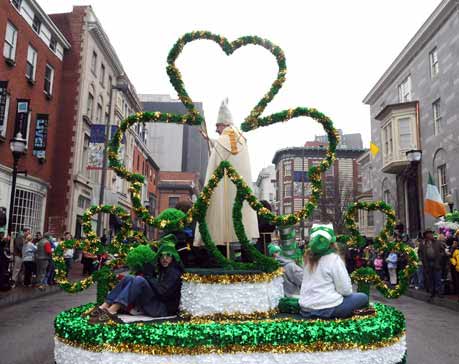
By Charlie Morgan
李薇 注
There are a lot of immigrants from Ireland in Canada and the USA. So, many people celebrate their national day on March 17th. New York City has a big parade[2]. People wear green (Ireland’s national color). And lots of adults go to a bar. It has gradually become more of a secular[3] celebration of Ireland’s culture.
A: Hey, are you doing anything special for Saint Patrick’s Day?
B: What’s St. Patrick’s Day?
A: It’s Ireland’s national holiday.
B: Is it popular to celebrate this day here?
A: Yes, there are many people of Irish extraction in Canada and the US.
B: Yes, but I’m not of Irish descent[4]. Are you?
A: I’m part-Irish on my mother’s side. So, my roots are Irish. But, you don’t need to be Irish to celebrate. Anyone can be Irish on March 17th.
B: How do people celebrate this day?
A: First of all, you need to wear something green. It’s traditional. Green is Ireland’s national color. If you have a shamrock[5], wear that, too.
B: What’s a shamrock?
A: It’s a clover[6]. It’s a symbol of Ireland.
B: I just have green socks. Is that okay?
A: It’s better than green underwear. It’s also the custom to go out to eat Irish food or drink Irish beer. Some bars put green food coloring in all their beer. The bars are hopping on St Patrick’s Day!
B: I’m not old enough to go to a bar. What can I do?
A: Well, if you’re barred from a bar, you can still get green cake or a green milkshake[7] in some restaurants. And, you can watch the parade.
B: I like parades. Are you going?
A: Yes, it’s this weekend. I can draw a picture of the parade route for you.
B: The 17 falls on a Wednesday this year. Why is the parade on the weekend?
A: It’s because people have to work on Wednesday. St. Patrick’s Day isn’t a statutory holiday here.
B: If I say I’m Irish, can I get a day off?
Vocabulary
1. St. Patrick’s Day: 圣帕特里克节,每年的3月17日,这一节日5世纪末起源于爱尔兰,为了纪念爱尔兰守护神圣帕特里克,如今已成为爱尔兰的国庆节。
2. parade: (庆祝)游行。
3. secular: 世俗的。
4. descent: 血统,世系。
5. shamrock: 三叶草,爱尔兰的国花。
6. clover: 三叶草,苜蓿。
7. milkshake: 奶昔,即泡沫牛奶,是一种将牛奶和冰淇淋等混合后搅打至起泡的饮料。
Exercise
1. national holiday a. old-style for many years
2. celebrate b. a habit for these people, very old and traditional
3. extraction c. a day when you do not have to work
4. root d. I’m not allowed to enter there anymore
5. traditional e. a substance used to give a particular color to food
6. custom f. to be from a French, Russian etc. family even though
you were not born in that country
7. food coloring g. your connection with a place because you were born
there, or your family used to live there
8. hopping h. by law, all have no work on this day
9. bar (vt.) i. a bar or restaurant etc. is so busy and exciting
10. route j. do something for a special day
11. statutory holiday k. the roads you choose to take
12. day off l. a country’s special holiday
Answers: 1–l, 2–j, 3–f, 4–g, 5–a, 6–b, 7–e, 8–i, 9–d, 10–k, 11–h, 12–c
Usage Tips
1. 说到symbol,也就是象征,往往指的是代表某种特定含义的一幅画或一个物体,如加拿大的象征是枫叶,美国的象征则是自由女神像,等等。
2.“传统”的对应英文说法是tradition,指的是代代相传的伦理、行为规范和生活方式,特指因长久奉行而几乎具有法律效力的习惯或习俗,侧重历史意义,“传统”并不一定得以流传下来。每一种文化都有自己特有的传统服饰、音乐和美食(traditional clothes, music and food)。
3. custom是“习俗、风俗”的意思,跟tradition比较相近,不同的国家有不同的风俗和传统。但它与tradition的区别在于,tradition是指代代相传并且不能被轻易改变的思维方式或行为习惯等,而custom则相对个例化一些,而且较容易改变,可新可旧。比如,去见客户时要跟对方握手;为表现绅士风度,男士为女士开门等等这些礼貌的风俗习惯,都属于custom。
(来源:英语学习杂志)